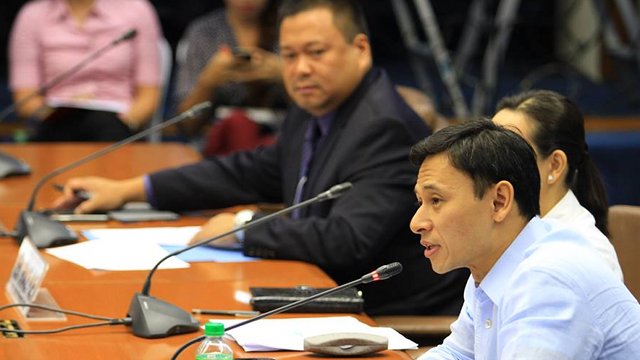SUMMARY
This is AI generated summarization, which may have errors. For context, always refer to the full article.

MANILA, Philippines – Mr President, your concerns are already addressed.
Advocates of the Freedom of Information (FOI) bill reassured President Benigno Aquino III that the measure will not cover matters of national security and diplomatic affairs.
Representatives from government, civil society, the media, academe, and the business community unanimously supported the bill during the Senate public information and mass media committee’s first hearing on the measure for the 16th Congress on Wednesday, September 4.
The FOI bill aims to institutionalize the right to know and policy of public disclosure enshrined in the Constitution by providing a system for ordinary citizens to access government documents and information.
“Under the administration of President Aquino, who has been, in my personal opinion, one of the most transparent presidents we’ve seen, it would seem ridiculous that this kind of legislation could not pass,” said Vince Lazatin, executive director of the Transparency and Accountability Network.
Lawyer Nepomuceno Malaluan, lead convenor of the Right to Know Right Now coalition, responded to Aquino’s statements that he is concerned that the FOI bill will bar cabinet secretaries from candidly expressing their thoughts during policy meetings.
Aquino made the statement in an interview with the Inquirer last week. The President has drawn flak for his lukewarm support for the bill after making a campaign promise to push for its passage.
“We don’t know where the President is coming from, but that was inserted in the FOI bill in the Malacañang version adopted by the Senate as early as the last Congress and the House: the presidential communications privilege precisely to protect the confidentiality of the deliberative process of the President so he can be assured of free and frank opinion and advice,” Malaluan told Rappler after the hearing.
Presidential Communications Development and Strategic Planning Undersecretary Manolo Quezon also told the committee that he is confident the Senate bills reflect the Palace version.
Quezon said provisions were inserted to address the President’s concerns that the FOI bill may harm business transactions, violate privacy and executive privilege, and compromise national security and national defense. These formed part of the exceptions to FOI requests.
“The President was upfront with his concerns. That is why the President supports the bill we submitted to you. He is satisfied with that,” Quezon told senators.
Senators and resource persons stressed that the decade-old bill is long overdue and takes on a new significance following the multi-billion-peso pork barrel scam, which revealed an intricate web of corruption involving lawmakers, government agencies, and fake non-governmental organizations.
READ: ‘Pork barrel scam shows need for FOI‘
Committee Chairperson Grace Poe said the panel will hold one more hearing on the bill before submitting a report to the plenary.
There are currently 9 versions of the FOI bill in the Senate. Three of the authors – Senators JV Ejercito, Sonny Angara, and Francis Escudero – attended the hearing.
‘Token transparency not enough’
Malou Mangahas of the Philippine Center for Investigative Journalism (PCIJ) stressed that the FOI bill will benefit not just journalists but also ordinary citizens.
She said that the transparency being practiced in the executive branch is not enough. The Palace has said the government is already making public documents available through its websites.
“That is token transparency…. Transparency and accountability are inseparable principles. We cannot just disclose documents without telling citizens where the funds were spent, whether the project was completed, who got the money.”
Mangahas also reiterated that the right-of-reply provision is “disastrous” for the bill. The provision requires media outlets to give equal space or airtime and the same prominence of space to an official who might be implicated in their reports based on information accessed through the bill.
“The pork barrel scam is instructive about the value of the right-of-reply clause. COA (Commission on Audit) gave information but most of the lawmakers don’t want to reply even if the media is seeking comment,” she added.
Other resource speakers also supported the bill but suggested amendments.
Professor Danilo Arao from the University of the Philippines College of Mass Communication said the 15-day period for granting FOI requests is “unrealistic and unacceptable” for journalists working on deadlines. Read the College’s position paper here.
Mike Mella, counsel for the National Press Club, said Escudero’s bill was too general in discussing the exceptions on privacy and financial secrets and must be amended.
The Kapisanan ng mga Brodkaster ng Pilipinas suggested that government officials not be held liable if the requested information was already uploaded to government websites.

‘Janet Bariles Napoles’ testifies
Poe said her committee will clarify the exceptions for FOI requests, and the sanctions for government officials who violate the law.
Some versions of the bill suggest both administrative and criminal sanctions, with imprisonment reaching 6 months.
Advocates expect a smooth and swift passage of the FOI bill in the Senate, which approved the measure in past Congresses. Senate President Franklin Drilon has also said that the bill is a priority and must be passed soon.
It is in the House of Representatives where the group expects challenges, especially in relation to the right-of-reply provision.
Mae Paner of the Right to Know coalition provided a moment of levity as the artist portrayed “Janet Bariles Napoles” in the hearing. Janet Napoles is the alleged brains behind the pork barrel scam.
She said, “Ako daw ang best example sa FOI. Kung ako na nga, ano mangyayari pag napasa? Kulong ako forever? Ayaw. ‘Pag di napasa, malaya ba ako? Exciting, di ba, ang saya? May oportunidad for big change.”
(They say I am the best example of FOI. If I truly am, what will happen if this is passed? I’m in jail forever? I don’t like that. If it’s not passed, am I free? Isn’t it exciting? There’s opportunity for change.)
“Kaya ba? Kasi iba ang sasabihin ‘nyong ipapasa ‘nyo pero pag andun na, lokohan uli. Wow naman. Ano bang klaseng pagbabago ang gagawin natin ‘pag natuloy ang FOI?”
(Can you do it? It’s one thing to say you will pass it but when time comes, it will be a joke again. Wow. What kind of change are we going to do if FOI is passed?) – Rappler.com.
Add a comment
How does this make you feel?
There are no comments yet. Add your comment to start the conversation.